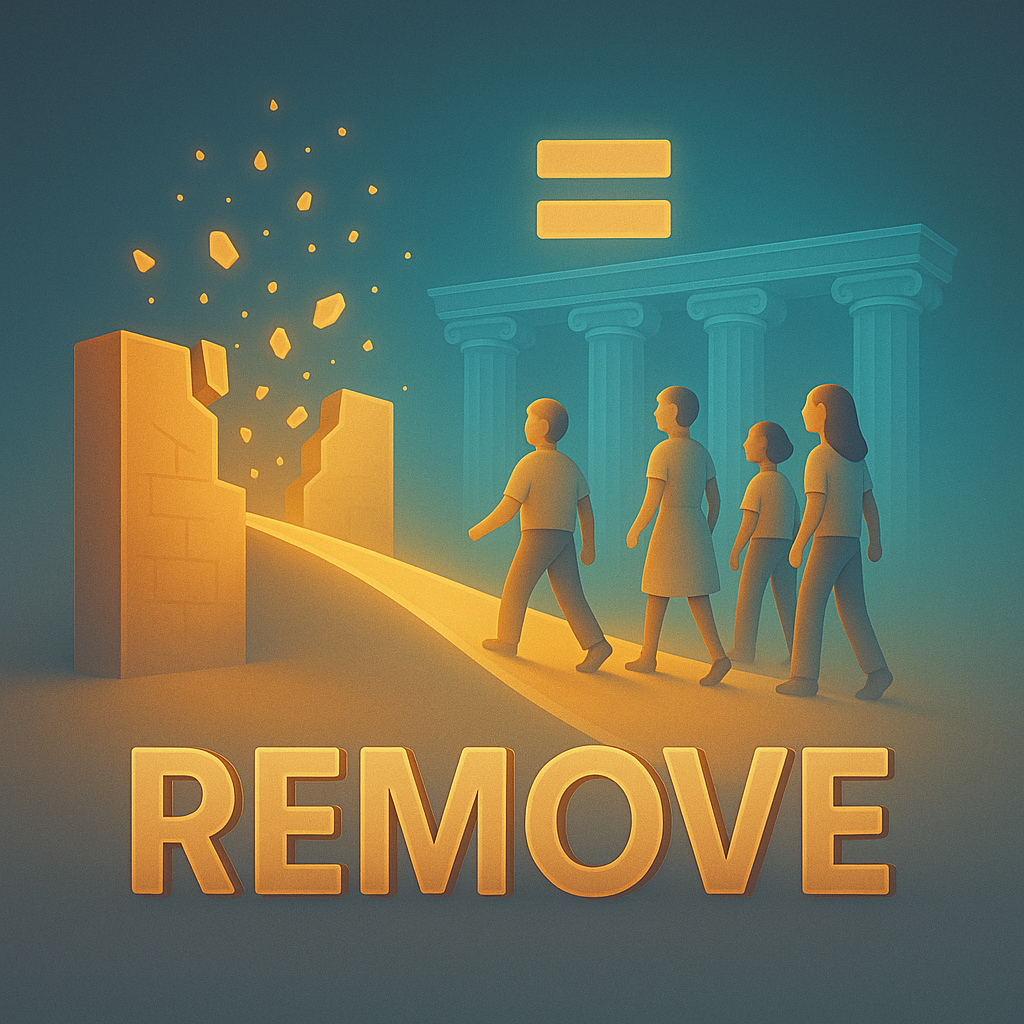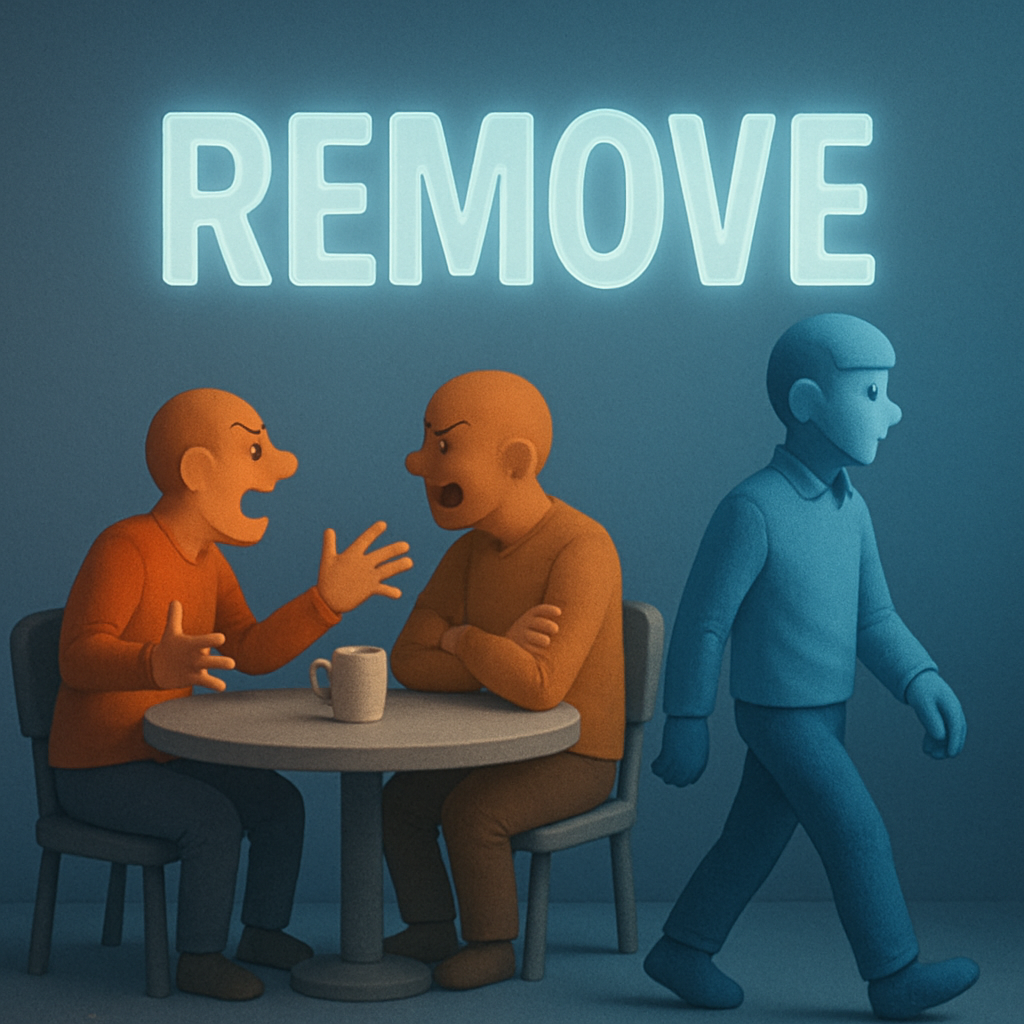Remove
Definition
The verb "remove" means to take something away or eliminate it from a place, position, or condition. It can also refer to distancing oneself from a situation or context.
Parts of Speech
- Verb
- Noun (rare)
Pronunciation
American English
- IPA Pronunciation: /rɪˈmuːv/
- Respelling: ri-MOOV
British English
- IPA Pronunciation: /rɪˈmuːv/
- Respelling: ri-MOOV
Etymology
The word "remove" originates from the Latin "removere," meaning "to move back or away," derived from "re-" (back) and "movere" (to move). It entered Middle English through Old French in the 14th century.
Derivatives
- Removal (noun)
- Removable (adjective)
- Removed (adjective)
- Remover (noun)
- Unremoved (adjective, rare)
Synonyms
- Eliminate
- Delete
- Extract
Antonyms
- Add
- Insert
- Include
Usage
The verb "remove" is used in various contexts such as physical displacement, elimination, and emotional detachment. For example: "Please remove your shoes before entering," or "They plan to remove outdated regulations."
Related Terms
- Elimination: The act of completely getting rid of something.
- Displacement: The action of moving something from its position.
- Extraction: The process of pulling or taking something out.
Detailed Definitions
Verb
- To take something away from a place or position: Refers to physically or metaphorically displacing something.
- Example: "They removed the old furniture from the house."
- To eliminate or get rid of something: Refers to abolishing or eradicating a condition or object.
- Example: "The law aims to remove barriers to equal opportunities."
- To distance oneself from a situation: Refers to stepping away physically or emotionally.
- Example: "He chose to remove himself from the argument."
Noun
- A degree of distance or separation: Refers to a figurative or literal gap.
- Example: "He observed the problem from a critical remove."
remove



🇨🇳 Chinese (Mandarin)
- 移除 (yíchú)
- IPA: /i˧˥ ʈʂʰu˥˩/
- Respelling: yí-chú
- 删除 (shānchú)
- IPA: /ʂan˥˩ ʈʂʰu˥˩/
- Respelling: shān-chú
🇮🇳 Hindi
- हटाना (haṭānā)
- IPA: /ɦəʈaːnaː/
- Respelling: ha-taa-na
- निकालना (nikālnā)
- IPA: /nɪkaːlnaː/
- Respelling: ni-kaal-na
🇪🇸 Spanish
- Quitar
- IPA: /kiˈtaɾ/
- Respelling: ki-tar
- Remover
- IPA: /re.moˈβeɾ/
- Respelling: re-mo-ver
🇫🇷 French
- Enlever
- IPA: /ɑ̃l(ə)ve/
- Respelling: an-le-ve
- Supprimer
- IPA: /sy.pʁi.me/
- Respelling: su-pri-me
🇦🇪 Arabic (Modern Standard Arabic)
- إزالة (izāla)
- IPA: /ʔizaːlaː/
- Respelling: izaa-la
- حذف (haḏaf)
- IPA: /ħaðaf/
- Respelling: ha-dhaf
🇧🇩 Bengali
- অপসারণ (ôpasharôn)
- IPA: /ɔpoʃarɔn/
- Respelling: o-po-sha-ron
- মুছে ফেলা (muchē phēlā)
- IPA: /mutʃe pʰela/
- Respelling: mu-che phe-la
🇷🇺 Russian
- Удалить (udalit')
- IPA: /ʊdɐˈlʲitʲ/
- Respelling: u-da-lit
- Исключить (isklyuchit')
- IPA: /ɪsklʲʊˈtɕitʲ/
- Respelling: is-klu-chit
🇵🇹 Portuguese
- Remover
- IPA: /ʁɨˈmɔvɨɾ/
- Respelling: re-mo-ver
- Eliminar
- IPA: /ɨlimiˈnaɾ/
- Respelling: i-li-mi-nar
🇮🇩 Indonesian
- Menghapus
- IPA: /məŋ'ɦapus/
- Respelling: meng-ha-pus
- Membuang
- IPA: /məm'bu.aŋ/
- Respelling: mem-bu-ang
🇩🇪 German
- Entfernen
- IPA: /ɛntˈfɛʁnən/
- Respelling: ent-fern-en
- Löschen
- IPA: /ˈlœʃn̩/
- Respelling: löschen
🇯🇵 Japanese
- 取り除く (torinozoku)
- IPA: /toɾinozo̞kɯ̟ᵝ/
- Respelling: to-ri-no-zo-ku
- 削除する (sakujo suru)
- IPA: /sakɯ̟ᵝd͡ʑo sɯ̟ᵝɾɯ̟ᵝ/
- Respelling: sa-ku-jo su-ru
🇻🇳 Vietnamese
- Gỡ bỏ
- IPA: /ɣo˧˥ ɓɔ˧˧/
- Respelling: go bo
- Loại bỏ
- IPA: /laːj˧˧ ɓɔ˧˧/
- Respelling: lai bo
🇰🇷 Korean
- 제거하다 (jegohada)
- IPA: /t͡ɕeɡoha.da/
- Respelling: je-go-ha-da
- 삭제하다 (sakhohada)
- IPA: /sa.kʰo.ha.da/
- Respelling: sak-ho-ha-da
🇹🇷 Turkish
- Kaldırmak
- IPA: /kɑlˈdɯɾmɑk/
- Respelling: kal-dur-mak
- Çıkarmak
- IPA: /tʃɯˈkɑɾmɑk/
- Respelling: chu-kar-mak
🇵🇰 Urdu
- ہٹانا (haṭānā)
- IPA: /ɦəʈaːnaː/
- Respelling: ha-taa-na
- مٹانا (mitānā)
- IPA: /miʈaːnaː/
- Respelling: mi-taa-na





